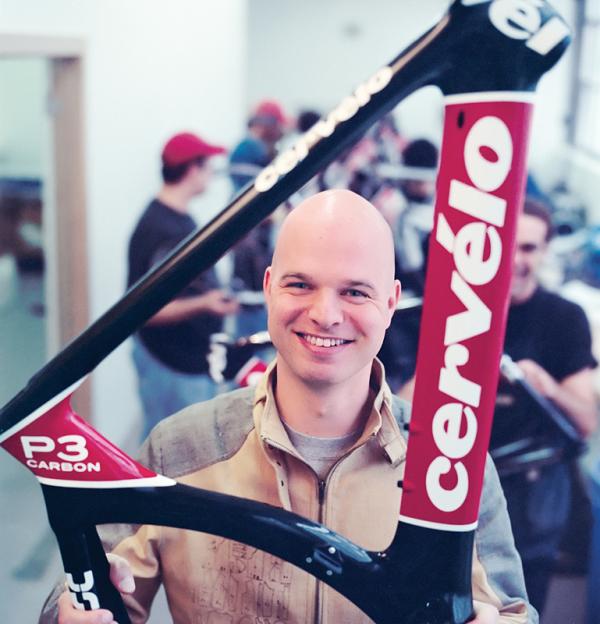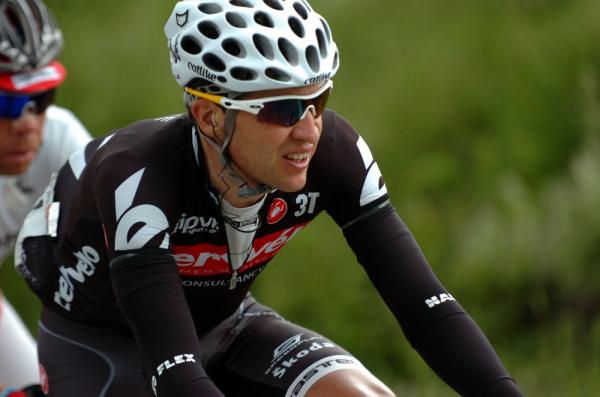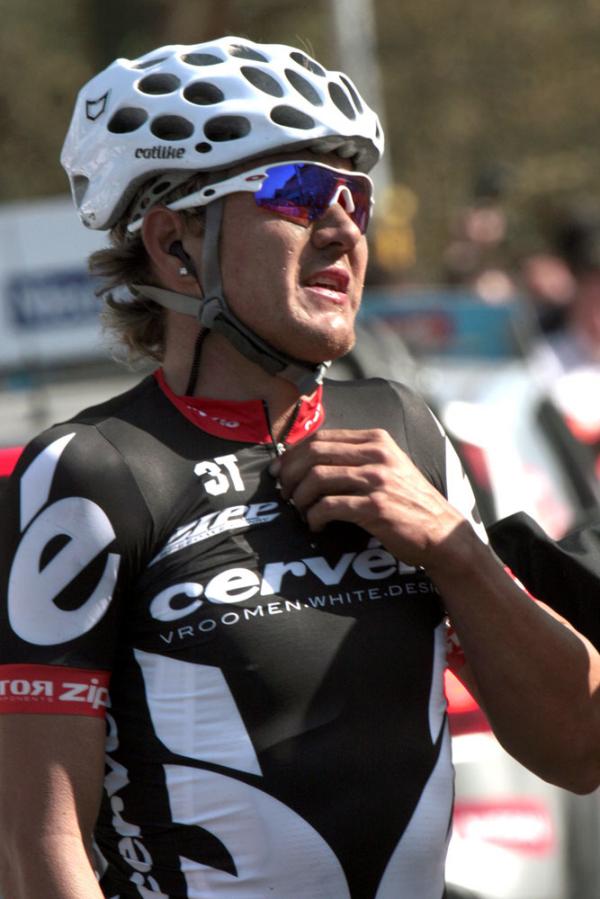A Vroomen with a view
Cervélo team boss talks about winning, doping



Gerard Vroomen is the co-owner of bicycle manufacturer and team sponsor, Cervélo. Along with sponsoring a cycling team, Vroomen has set about instilling a philosophy within his riders that goes beyond the demand of winning at all costs. Instead the team place race success alongside product development and fan access as their top goals.
However Vroomen also has some clearly defined ideas on how the sport should conduct itself and how to fight the war on doping - a war he says the sport isn't doing enough to combat.
Cyclingnews: You've said that winning is only one part of the team's objectives. How do you balance that with the competitiveness within the sport?
Gerard Vroomen: Obviously the biggest goal within sport is to win. The question is what are you willing to do in order to achieve that? I don't want to change cycling for riders to aim at finishing last and if it's a choice between wining and coming second, you'll try and win. However, winning at all costs is a particularly strange concept in cycling. What I mean is within cycling, winning from a financial point of view is not nearly as important as it is in other sports.
People talk about the risk-reward calculation for doping. If the risk of cheating is small and the reward is large then you have a problem.
If people don't have that data (of how financially unimportant winning is in cycling, relative to other sports) they can't make the correct calculation and that’s when people take those risks. Of course you may have your own moral standards that prevent you from cheating.
CN: Can you elaborate on some of your ideas when it comes to fighting doping?
The latest race content, interviews, features, reviews and expert buying guides, direct to your inbox!
GV: All my ideas on the anti doping fight are variations on how to change the balance between risk and reward. On the one hand people need to understand what the rewards really are for doing right and wrong and we, the sport, need to see how we can tweak that.
The whole construction of sports, and not just cycling, is stacked against solving the doping problem. We need quite a few structural changes to combat that.
CN: Is it easy to say winning is not the be all and end all when you have a bike firm as the main sponsor? There are teams out there that don't have the same ties to the sport as you do and need to maximise exposure to an audience that may not be as familiar to them as Cervelo are.
GV: There are a couple of different levels. For the rider, winning is important and if he doesn't have the drive to win he'll never make it to the top level. For us as a sponsor, winning is not that important because on the one hand we also focus on product development and fan access. But also, winning is not that big a factor in how much exposure you get. So even for companies just looking for exposure, winning is not that important as say winning in soccer. It's still significant but it's not as big.
But the obsession of winning seems to be as large or if not larger in cycling than in other sports. That's the discrepancy that we're seeing.
We try and give our riders the best chance to be successful but if that's first, second or tenth that isn't controlled by us. If we come second it's because another guy happened to be faster.
CN: If you look at soccer clubs in Europe though, they might finish seventh in a league, miss their targets. As a result the manager is sacked, players leave. You don't really have that in cycling. For example, if Astana don't win the Tour it's unlikely they would have a huge reshuffle.
GV: There are several reasons for that. Firstly the return on investment in cycling is so great. The investment is so good even if you did finish seventh in a major race. Cycling is essentially unsophisticated in how it's marketed. So you have these companies getting 60 million in exposure and they pay a tenth of that so even if you have a bad year your exposure is still a great deal.
In soccer it's more competitive and the deals are more sharply calculated and so a bad year really has an effect. So not being in the Champions League has such a big effect on their budget through things like TV rights.
So there's more stability in cycling, and that's another reason not do any thing stupid. It all points in the same direction.
CN: It's fair to suggest that Cervelo has not been as successful as last year but what you're saying is you've not noticed a drop in marketability or exposure this time around?
GV: It's not really a fair comparison. Last year we were new and that gives you exposure in itself. But we've not seen a big difference compared to 2009 because the reasons fans are so engaged in our team is not because we won a race last week but because of the story of our team. People like to learn more about what's behind our team and riders. So, for example our video views are up on last year. There are compelling reasons for fans to engage with us.
CN: Do you think that the sport is doing enough to combat doping?
GV: No. Not a single sport is and cycling is no different.
CN: Where is it falling down then?
GV: I don't get the sense that there's a grand plan. The UCI is doing its thing, the teams are doing theirs, some race organisers are taking some steps but as for the over-arching plan, I'm not sure it exists.
So, when you have problem this massive you need that plan, but I don't see any blueprint and that's the scary part. And it's scary that a lot of sports are looking at cycling and trying to emulate that. I agree there are some good steps being made in cycling that are worth copying but I don't see a strategy because it would involve all those parties working together and as you know not all of them get along swimmingly.
CN: The UCI are keen to stress that there's been a cultural shift within the sport in the last few years, certainly amongst the riders. Would you agree?
GV: I think it's true, there has been. But it's tough to say that riders have changed morally or that it's just that the circumstances have changed in which they find themselves. It's a lot easier for them to resist the pressure they used to find themselves under though, for sure. From everything I hear there's been a very good shift in the last ten years.
CN: Has the Biological Passport been integral in that shift?
GV: Well look at someone like Dr Mike Ashenden. He is very level headed and heavily involved. He realises it's not perfect and it's a work in progress. When someone sneaks through the net he comes out and says that we can learn from it and that's exactly what it is - a work in progress. It's always going to need tweaking. It hasn't solved the problem of doping and it's not the golden bullet. I don't think there is one.
CN: In your opinion what are the challenges that the passport faces?
GV: What's going to be difficult is how they use the data to make a strong and convincing case. The concept of there being a biological passport that calculates values and says whether the rider is clean or not is fine, but the rider has no insight into how the values are calculated, that might be a bit of a problem legally. For example, I don't think you can convict someone of murder by saying 'we know you did it but we can't say how we know.'
Also cheaters are adjusting their methods to whatever tests are out there. So as you need to refine your methods of finding irregularities it will be more open to challenges. It's tricky.
CN: We touched on this last year during the Annecy time trial in the Tour de France but do you think that the 2009 Tour was cleaner than the 2008 race?
GV: What was my answer a year ago?
CN: I think you said that there were some 'surprising performances.'
GV: In 2008 the riders were completely convinced that they had a product that could not be detected, CERA. And it turned out that it could be. So what 2008 showed is that even if you have product that's not detectable and it's easily accessible, there were only a small number of riders that chose to use the product, which to me is very positive.
In 2009 we didn't have a similar situation. We didn't have a drug like that so it's hard to compare. 2008 was a lucky strike.
CN: Back to your ideas on cleaning up the sport, you've also advocated for longer bans, with 8 years being mentioned.
GV: Certainly for wilful cheating, yes. I was thinking about this and how we have the discussion on motorised doping. What happens if someone is caught with an engine in their bike? No doubt they'd be banned for life. For CERA you get two years. Is one really more wilful than the other? I don't really see the difference especially when it comes to intent. It's a double standard.
However, I did add that I'm all for long penalties as long as the process is fair. The irony is that both the federations and the riders feel defenceless in these situations because of course the federations think that they have no power and it takes them four years to reach a resolution in part of the Puerto case.
On the rider side with the bio passport they can't see the evidence, their name's are leaked after the A sample is tested. The main problem are procedural and it's violated all the time or too complicated to begin with.
And in the end the federation isn't the one serving the penalty so yes, giving the riders a fair chance is paramount.
CN: Let's talk about the Tour briefly. How are your three aces in Carlos Sastre, Thor Hushovd and Heinrich Haussler doing?
GV: It feels like an episode of MASH but everyone seems to be on the mend. Heinrich was third last week, Thor will be back at the Tour de Suisse and we'll have to wait with Carlos and see but everyone is on the mend. That's cycling, last year we were relatively lucky and had few injuries, this year we have a lot of them but it's great to see that we have so many riders that can step up.
CN: What was your reaction to Heinrich being questioned by police for drink driving?
GV: It was obviously disappointing. It's not the kind of stuff you want to hear. We made that very clear and talked to him about the issue and what we expect from him. Now obviously we'll help him grow in life, that's part of the team too, to develop people.
CN: Does he go into the Tour with motivation to prove himself after such a mistake?
GV: I hope not. He needs to do the right things, make the right steps and then ride the Tour if he's fit. He shouldn't be overcompensating for anything. It's not like he has to do something in the Tour to make up for it. The crash and the Tour are totally unrelated and you don't make up for a personal mistake like that by riding your bike really fast. That would be insulting to the seriousness of the situation.
Daniel Benson was the Editor in Chief at Cyclingnews.com between 2008 and 2022. Based in the UK, he joined the Cyclingnews team in 2008 as the site's first UK-based Managing Editor. In that time, he reported on over a dozen editions of the Tour de France, several World Championships, the Tour Down Under, Spring Classics, and the London 2012 Olympic Games. With the help of the excellent editorial team, he ran the coverage on Cyclingnews and has interviewed leading figures in the sport including UCI Presidents and Tour de France winners.
